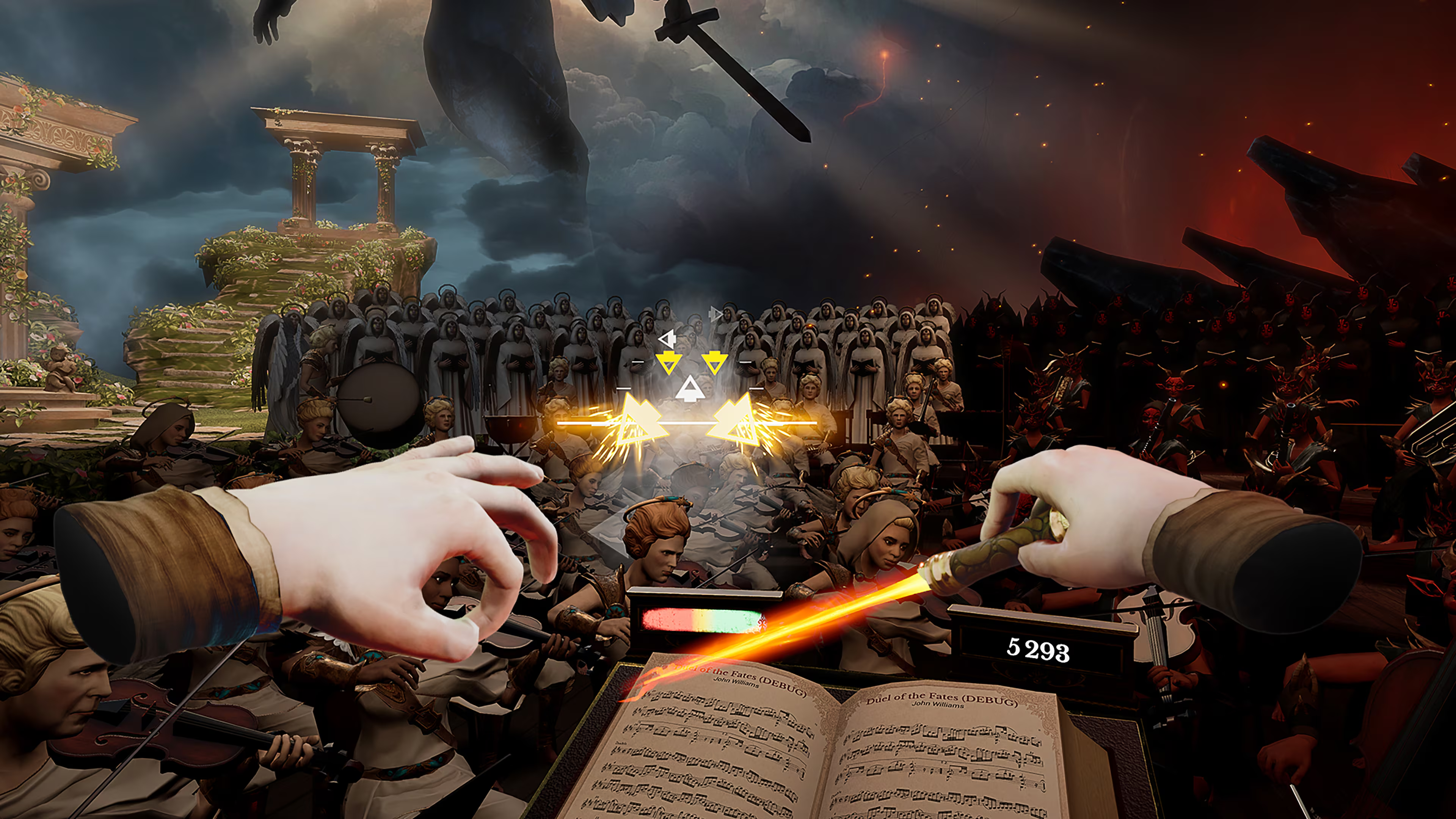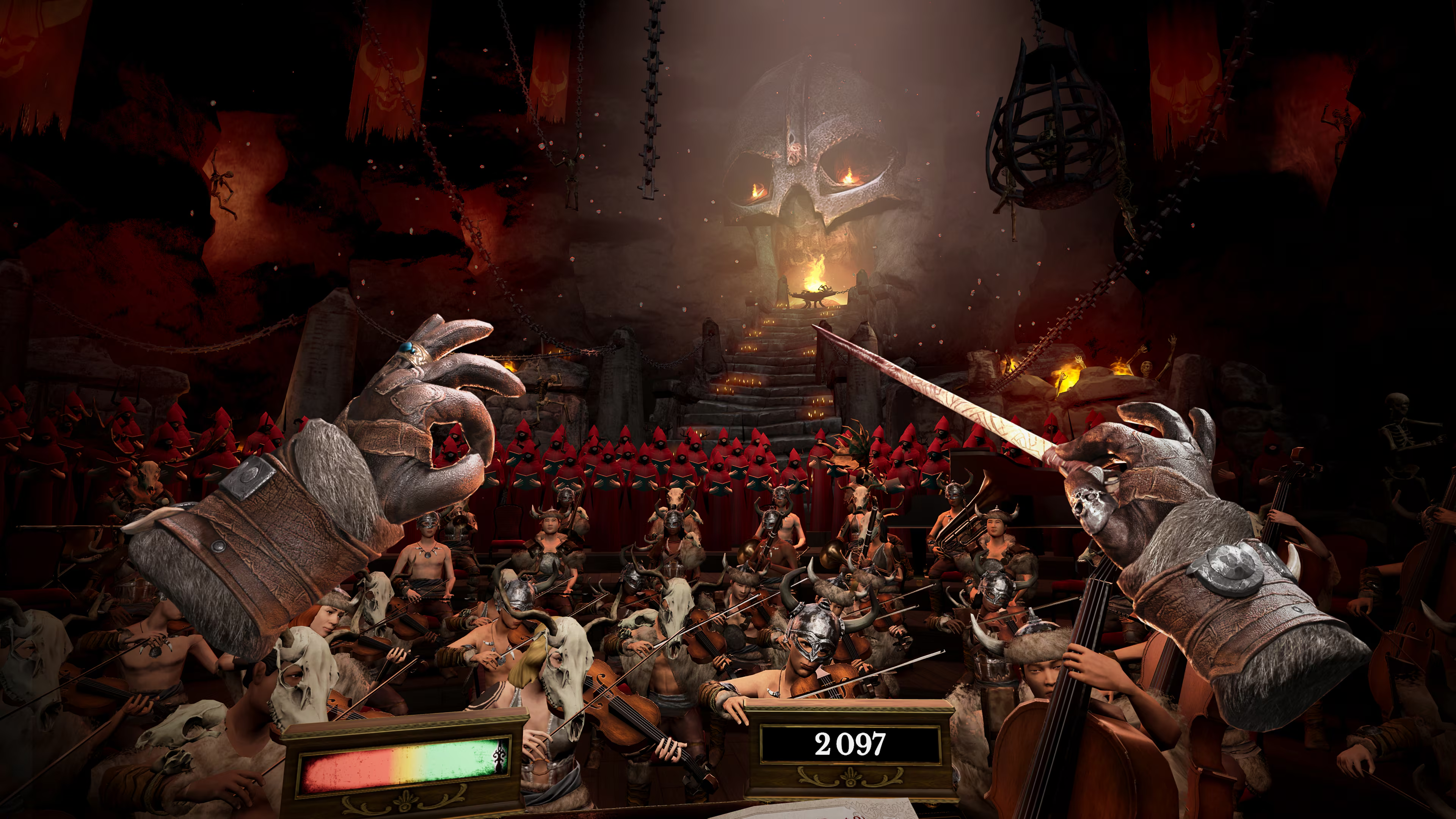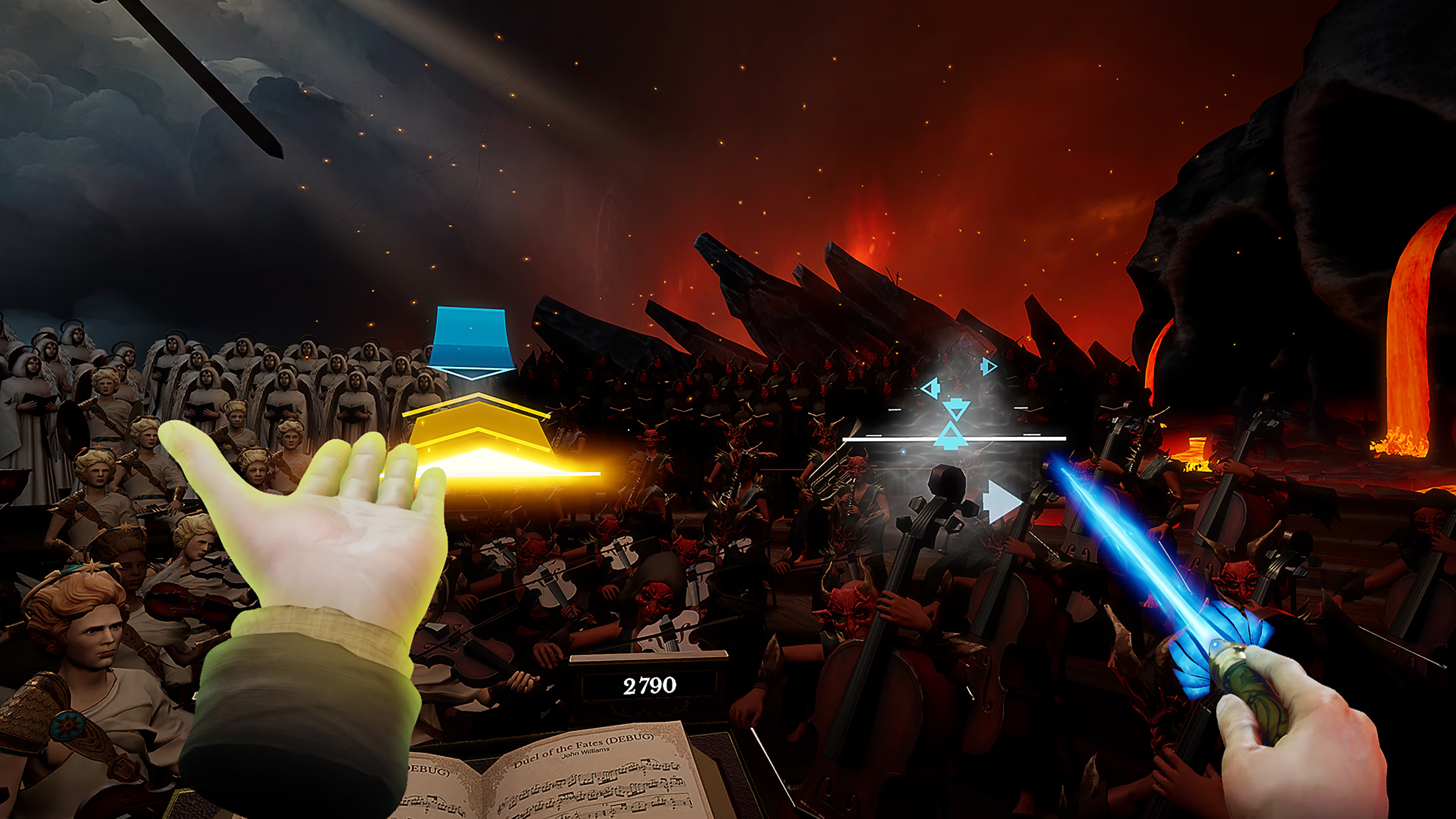VR has offered some unique scenarios as of late, with PSVR2’s catalogue being no different. I’ve been kayaking, played drums, turned a laundrette into an arcade, but I never thought I’d be conducting an orchestra. Maestro does exactly that. Posed as a rhythm game that lets you control a fleet of musicians with your hands, Maestro lets you conduct some of the biggest classical pieces ever.
If you’ve watched any movie from the pre-2000s or been blessed with the movies of Stanley Kubrick, you are bound to have heard one of the songs in the game’s setlist. This is where I’ve come at it from, Classical music isn’t exactly on my playlists, but I’d be lying if I said Ride of the Valkyries doesn’t create a fight or flight response, much like the infamous scene in Apocalypse Now.
It’s not all 18th century bangers, however, as the music stylings dips its toes into Jazz and some modern pieces from the likes of John Williams – if you buy the DLC. I went into Maestro cautiously optimistic, as VR games tend to thrive on having a gimmick that often is short-lived. This is either because it’s not as well executed as it could be, or the gimmick in question is very surface-level, but I’m very happy to report that this is not the case here at all.
Feeling Like a sTár
Developers Double Jack have carefully curated the orchestrating experience to be one that’s succinct and faithful to the art at hand. I’ll come out and put it plainly: I’ve never known what a conductor really does. I understand they’re commanding their orchestra on how to play, but all the hand gestures are a language all in itself that I can’t decipher.
Maestro then takes the time and consideration to put you into a tutorial, giving you an insight into what these spellcasting-like hand gestures are all about. The game starts with a tutorial where you are welcomed by Eric, a French aristocratic type who aids your journey into being the newest conductor for the band. It feels like the blossom of a potential narrative for the game, but after the tutorial, there’s no real back and forth between any of the people you’ll meet in the game, which is a slight shame.
Anyway, you’re taught the basics like tempo, accents, cues, crescendos and the like. It takes around 20 minutes in what feels like a crash course, but it’s a perfect intro into all the rhythm game mechanics in play. Being in VR, this is a first-person experience where you’ll be facing your band. Notes and actions crawl on screen above the area of the band you’re conducting, with a line signifying when to repeat the action that’s crawling. Think of it as how Guitar Hero’s fretboard continuously crawls downwards, and you’re to play the note when it hits the line of colour-coordinated notes.

Conducting Heat
Maestro does things a little differently, though. Instead of playing notes that match a colour, you’re using both hands to repeat actions in time with the music. With your right hand, you’re flicking your baton in every direction, your left hand is used to point at sections of the band to play as well as raising and lowering their volume. Some movements require both hands, too, and it all culminates in feeling incredibly authentic to the conducting experience.
Despite its attention to authenticity, however, this is also a rhythm game that scores you on your performance, giving it that hi-score-chasing arcade-y aspect to it, albeit a very minor one. There’s no combo meter or a mechanic to boost your score at an opportune time, meaning your hi-score just means you’ve hit the most notes, and by midway through my Easy playthrough, I wasn’t missing one. This meant I was Number 1 on the leaderboard, given the full 5 stars for my performance, but no overwhelming sense of achievement.
It’s strange, having a game that incentivises you to do the best, but no real sense of progression attached to it. This resulted in me just going through the playlist, song by song, and I had beaten all the base-game songs in around 2 hours. In that time, I unlocked new settings, new batons, new hand-styles and new costumes for my orchestra, but I didn’t feel like I earned any of it.

Orchestrating My Downfall
It teeters the line of being so casual that nothing matters and so perfection-focused that you’re going to need a lot of practice – especially in the harder difficulties. However, nothing is pulling me to learn how to hit those hi-scores on hard mode, because everything can be achieved on Easy. I guess if you’re really into how this game plays or the music you’re playing, that grind will feel worth it to you, but there’s nothing in-game that wants me to go back and do a playthrough on hard.
Playing through the setlist initially was a lot of fun. I experimented with the unlockables, and all the stages react to your performance in fun ways, with cannons firing or confetti flying as I’m hitting those crescendos. I even had a lightsaber as my baton for a few songs. These are all neat parts of the game that show Double Jack wanted to create a fun and immersive conducting experience with Maestro.
On the technical side, the hand tracking is perfect when playing the songs themselves. Every movement felt exactly how it should; I was only ever hindered by my own skill rather than the game not reading my actions correctly. On the other hand, the menu is cumbersome to navigate. Filing through the setlist, picking from the menu felt a little clunky, and I never quite knew if it was my finger or baton that was selecting off the menu for me, but it performs perfectly where it matters, most importantly.

The Show Must Go On
It is graphically lacking, even for a VR title, with your band looking really rough around the edges and the static environment being absent of great detail, though it does make up for it with its simple but effective style. The base setlist is also pretty short, with fewer than 20 songs to choose from (30+ with all the DLCS), so it is on the shorter side.
The concession there would be that every song is a big song you’re playing. Whether it’s Beethoven, Wagner, Vivaldi or some of the contemporary Jazz songs, and recent film scores like John Williams, they’re all are all well-known tracks. I don’t know the game’s budget or the allocation, but I’d hazard to guess that the songs they’re licensing aren’t very cheap, so as to give the player memorable ones to play through and not something placeholder and forgettable.
Overall, Maestro is a short but decent time. The songs are incredible, the gameplay is fine-tuned and well-thought-out, but its confusion in identity muddies who this game is for. As a fan of rhythm games, it’s lacking in the surrounding mechanics that make them replayable, whilst being good at its core. Things like being able to create a setlist and not going in and out of a cumbersome menu would do wonders for something like this.
If you’re looking for something unique in VR, Maestro is here, and whilst it’s closer to roleplaying as a conductor than being a gimmick, there isn’t a great deal to do outside of that. There’s no encore for me, but I’m willing to give Maestro its roses.
Maestro is out now for PSVR2 (review platform), Quest and PC via Steam.
Developers: Double Jack
Publisher: Double Jack, Creature Label
Disclaimer: In order to complete this review, we were provided with a promotional copy of the game. For our full review policy, please go here.
If you enjoyed this article or any more of our content, please consider our Patreon.
Make sure to follow Finger Guns on our social channels. Twitter, Facebook, Twitch, Spotify or Apple Podcasts – to keep up to date on our news, reviews and features.
